Self-love and self-care after narcissistic abuse aren’t just about ‘treating’ yourself. They’re a vitally important piece in the process of putting all the fragmented parts of yourself back together.
From my own experience, one of the hardest things about narcissistic relationships is that the damage is invisible. Sometimes, during my recovery, I actually wished my ex-husband had left bruises from the damage he’d done because then at least my brain would have had the evidence it needed to see what was going on right under my nose.
After leaving my narc ex of twenty years, I remember being in regular states of complete despair. It’s like my insides would be screaming at me, as I was trying to understand that the person who was supposed to love me never truly did at all. Every single thing he’d ever done was purely for self-gain and to feed off of my life force energy.
If you’re here reading this post, I’m sure that you can relate. For the first time in my life, I understood why self-love is so crucially important, particularly when recovering from abuse.
Self-love and self-care after narcissistic abuse cover getting your physical body healthy, as well as making sure that you look and feel good. It’s also about getting your spiritual and emotional health in a place where you can thrive beyond everything that’s happened to you.
Plus, self-care is about setting healthy boundaries and building your self-love to a place where no narcissist can ever have it over you again.
This post contains affiliate links, for more information, see our disclosures here.
Who is the Narcissist & Why Did They Come into My Life?

Who is the Narcissist?
Narcissists do not have a true, authentic self like whole, fully intact people do. Due to childhood trauma, they unconsciously severed the connection to their True Self because they deemed it useless. They decided that feeling empathy and emotion was too painful and that wasn’t how they were going to get ahead in life, so they discarded that aspect of themselves.
By cutting off their True Self, they were left with only one thing running the show – their ego. For the ego to remain in existence, it needs to be fed and inflated. Typical fodder for the ego is attention in all of its various forms.
For the narcissist to maintain the ego’s existence, they needed to create a False Self, which encompasses the many masks and facades they invent along the way. It’s through these false images and illusions that the narcissist can gain the much-needed attention. Both good attention (admiration) and bad attention (arguments and drama) supply the narcissist with life force energy.
If the narcissist starts to run low on attention, they will find themselves falling into their inner black hole, which they hate. If they are left with themselves and no source of supply, they will not be able to avoid the deep inward feelings of utter disgust, unworthiness and shame, which is how they truly feel about themselves.
Avoiding that dark soul, which is all they’re left with on the inside, is their life’s mission. Their only purpose in life is to seek out supply to gain some relief and keep the darkness at bay, much like a drug addict.
Since they don’t have personal access to their much-needed drug, the only way to obtain it is through pilfering and manipulating it from others.
They are no different to a vampire, feeding on the blood of others. However, for the narcissist, their drug of choice is life force energy.
Narcissists work to find your deepest wounds, which they intentionally open right up to elicit such excruciating pain from within you. It’s through this pain that they can extract your energy to feed their False Self, which is essential for keeping their ego alive.
Their ego is merely a cover-up, which allows them to feign confidence and assurance of themselves, in order to suck the life force from others. This life force energy is what we know as narcissistic supply, which alleviates the pain of that black hole. It keeps the ego inflated for a little longer before they need to hunt for more supply.
| READ: Narc Supply Explained → |
You cannot help or fix the narcissist, nor is it your responsibility to do so.
But here’s the thing. That black hole, which they’re constantly feeding through outside sources, will always remain a black hole. That means that it can never be filled, no matter how many resources get poured into it.
Ultimately, when you hand over your precious energy to a narcissist, you are allowing yourself to be emptied into the narcissist’s black hole, which is a bottomless pit.
The Narcissist’s Purpose in my Life
Your responsibility is to heal your inner wounds, which the narcissist so expertly located and triggered for you. That is the whole purpose of the narcissist coming into your world.
The narcissist was able to find your deepest traumas, some of which you were not even aware of yourself. Then they shone the spotlight on those very traumas, which in turn brought them into your full awareness.
While the narc will go about their life, leaving pain and destruction in their wake, they will refuse to grow and evolve in this lifetime.
But that’s not your path. You came here to heal, not only the wounds of this lifetime but your past life and generational wounds as well.
That’s why your life has probably felt so difficult because breaking ancient curses is not a task for the faint of heart!
But how could you know where to find all of those hidden and secret wounds unless someone came along to point them out to you?
Going through the narcissistic relationship was Part 1 of your healing quest.
Now it’s time for Part 2 – releasing the trauma and becoming your own source of love, security and validation.

Self-love & Self-care After Narcissistic Abuse
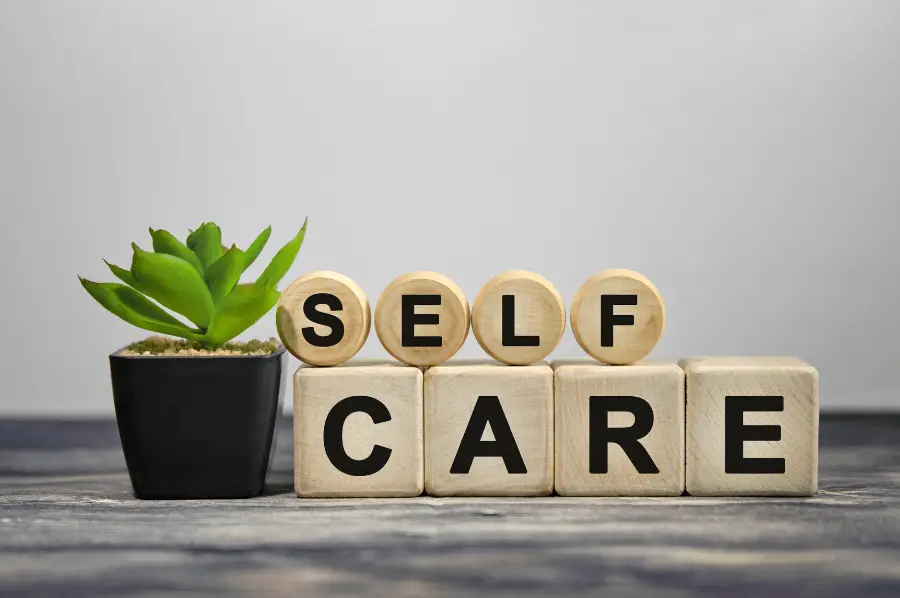
STEP 1: Cut the Narcissist Out
As the saying goes, you cannot heal in the environment in which you were hurt. This could not be more relevant for self-care after narcissistic abuse. Eliminating the narc is absolutely crucial for your healing, growth and working towards a place of self-love.
Whether the narcissist discarded you, or you were the one to leave them, you can almost guarantee that they will try to hook you back into their cycle of abuse.
Narcissists like to have multiple sources of supply on the shelf… you know, just in case another source dries up.
So, even if you’re not together any more, they’ll still feel completely entitled to you in whichever way they see fit. That might be for a bit of sex on the side, cash loans when they’re broke, a couch to sleep on, or even just someone to talk to who will validate their dramas.
How will a narcissist try to hoover you back in?
- Randomly contact you
- Pretend to be remorseful
- Act as though nothing has happened
- Offer false promises
- Profess their undying love to you
- Play the victim card
- Try to love bomb you again
- Make false accusations against you
| READ: More on Narc Hoovering → |
Staying in contact with a narcissistic ex is a recipe for ongoing triggers and Complex PTSD, neither of which will help you heal and move forward into a healthy life.
The narcissist is not your ‘friend’ – they never were. Don’t let them think that they can be now.
The narc will probably try to convince you that you can, ‘still be friends’ and you might even try it for a while. Beyond my better judgment, I went down that path to try and make the transition easier for the kids.
Spoiler alert – it did not work! Keeping him in my life in any capacity was just allowing him to continue sucking me dry, invalidate and manipulate me on the side and keep me in his abusive cycle.
| READ: Narc Abuse Cycle Explained → |
Low Contact
If you have kids with the narcissist, I recommend going Low Contact with them, which means you only communicate about the children and keep it to a bare minimum. I would also suggest keeping your communications to one written medium only (email, text, Our Family Wizard app etc.) and avoiding phone conversations where they can easily get you caught up in word salads.
No Contact
If you don’t have any children or business with the narcissist, it’s time to go No Contact. This includes deleting and blocking them on all social media. Trust me, as tempting as it is to still have access to their world, you’re only torturing yourself.
They love posting pics of how great they’re doing without you and how quickly they’ve replaced you. It’s like they get off on triggering you and smearing you. Don’t let yourself be a pawn in their game. By being the one to block the narc, you set the boundary that you no longer allow them or their behaviour in your life, which is very empowering.
No contact also involves ignoring any attempts the narcissist makes to get in contact with you, especially if they use fear and guilt tactics to coax you back.
| READ: No Contact with a Narcissist → |
STEP 2: Acknowledge the Abuse

Narcissistic abuse is one of the hardest forms of abuse to pinpoint. Being that narcs are masterful manipulators, you can easily flip from hating their behaviour to justifying it on a dime. Acknowledging the truth of what it was is an integral part of self-care after narcissistic abuse.
Even after being in an abusive relationship for two decades, I wasn’t able to actually admit to myself that it was abusive until I’d been out of it for months.
Admitting to yourself that the person you loved was intentionally hurting you is one very bitter pill to swallow.
You know that once you admit to yourself and others that they were abusive, there’s no going back. It changes everything.
Accepting that it was abuse can also trigger feelings of deep shame and unworthiness, which is another reason for delaying the inevitable. Because when we face the truth of the situation, we are then forced to look at our part in it.
Please don’t misunderstand me here – in no way am I saying the abuse was your fault. No way! How somebody treats another human being is wholeheartedly on them and a reflection of who they are.
However, it’s time to recognise your own deep programs, which drew you and kept you in a narcissistic relationship.
Examples of programmed patterns and beliefs:
- Feeling unworthy of being taken into account
- Belief of never being seen or heard
- Fear of being truly vulnerable and intimate
- Belief of not being able to take care of yourself
- Needing someone else’s approval to feel worthwhile
- Belief of being unlovable
- Belief that you’re not enough, just as you are
These are just a few examples, but you will have to dig deep to find your inner patterning. Have a look at how the narcissist treated you in negative ways and assess your programs around those issues.
It’s in the identification of these traumas that is your key to freedom and self-love because then you’re able to take responsibility for your healing and future pathways.
STEP 3: Grieve What Never Was
This is a HUGE one! The next step in self-care after narcissistic abuse is to allow yourself to grieve.
It can be a huge shock to realise that the relationship never was what you thought it was, no matter how hard you tried to ‘do better’ and fix things. Finally seeing that the person who you had loved with all of your heart, never was who you thought they were. These things can tear us apart inside and leave us with such intense feelings of sadness, anger and betrayal.
Going through a level of shock is also quite common after narcissistic abuse. The realisation that someone could be so intentionally and callously hurtful and manipulative, all while ‘appearing’ to be a good person. It’s all so hard to comprehend when you’re a decent human being who simply does not function in that same way.
I still struggle sometimes with the illusion of the wolf in sheep’s clothing.
Grant yourself as much time as you need to sob and release all of your ideals around that person and the relationship in its entirety. This is all a necessary process in breaking the trauma bond, which can be one of the most painful things you’ll ever go through.
Trauma Bond
The process the narcissist used to get you fully reliant on them. Over time through intermittent rewards and punishments, they programmed your emotional and chemical body to see them as your only source of relief from the very abuse in which they were instilling.
Trauma bonding is the psychological conditioning, which keeps you bound and loyal to your abuser.
STEP 4: Don’t Blame Yourself

Every person I’ve ever spoken to who’s been abused by a narcissist comes out the other side blaming themselves. This is a big part of the narc’s programming.
Throughout the relationship, you were always expected to be responsible for all of the narcissist’s baggage. They blamed you for the very things that they were doing and invalidated you for every little thing in between.
On top of that, you’re a kind, compassionate and empathetic person who does have the ability to self-reflect. You do aspire to be a better person, which involves being responsible for your own words and actions. It’s only natural to look at yourself and think, “How could I have done better?’
But above all else, you feel like such a fool to have been hoodwinked over and over by the very person you loved. You believed their apologies and truly thought that they were remorseful and that they’d change.
This isn’t your fault!
You wanted to see the good in them, so you gave them the benefit of the doubt, time and time again. Only to find out that every little thing was a bullshit lie, just to keep you in their manipulative cycle of abuse. They never actually cared for you, it was always about what they could get out of you.
Gosh, I’ve lost count of the number of times my narc ex would curl up into the fetal position on the bed and cry real tears when he’d been found out. Then I would end up being the one to console him and promise him that, “We’ll work it out. Don’t worry, I’m here for you.”
For so long after I’d left him, I felt sick to the stomach at how he’d emotionally blackmailed me into feeling sorry for him for his abuse towards me. The mind just boggles!
I really did think the whole damn thing was my own fault for staying and allowing his behaviour.
But I’ve now learnt that none of it was my fault. It was a result of a heavy trauma bond and deep wounding on my part.
Having to experience that relationship was a part of my soul’s mission to highlight my traumas, which were screaming at me to be seen and healed. It was no one’s fault, but merely a much-needed process in my journey towards my own soul’s evolution towards self-love, just as it was for you.
| READ: Why did the Narcissist Pick Me? → |
STEP 5: Create Healthy Boundaries
Now that you’ve done your best to cut the narcissist out and have time to process and acknowledge their abuse, it’s time to start focussing on yourself.
The next vital step in self-care after narcissistic abuse is to create healthy boundaries within your life. This doesn’t just apply to narcissists, but to anyone in general.
We teach people how to treat us by showing them what behaviour we will and won’t accept.
Write down some of the things the narcissist has said and done over the years that have truly hurt you and made you feel unworthy, ashamed, angry and invalidated. Now write down the opposite of those very things and you will begin to formulate a list of your new boundaries.
Healthy boundaries mean being able to say “No” when you want to and “Yes” when you want to. They mean not having to defend yourself against false accusations or being responsible for people who refuse to take responsibility for themselves.
When you have a good boundary function, you’re able to have honest conversations with people without the fear of what they might say or do. If they don’t like your truth and honesty, that tells you everything you need to know and you can both walk away on your paths.
Examples of healthy boundaries:
- Being able to say ‘no’ if people ask for a favour that you are unable/ unwilling to do
- Confidently speaking up and standing up for yourself when you feel you need to
- Not allowing disrespectful behaviour in your world
- Ending conversations and relationships that are invalidating, negative or abusive
- Not going along just to get along (no more people-pleasing)
- Stepping back from friendships and relationships that are not reciprocal
- No longer feeling the need to justify or defend yourself to others
- If something doesn’t feel right, being able to confidently act in your own best interests without question (trusting your intuition)
STEP 6: Heal Your Inner Wounds
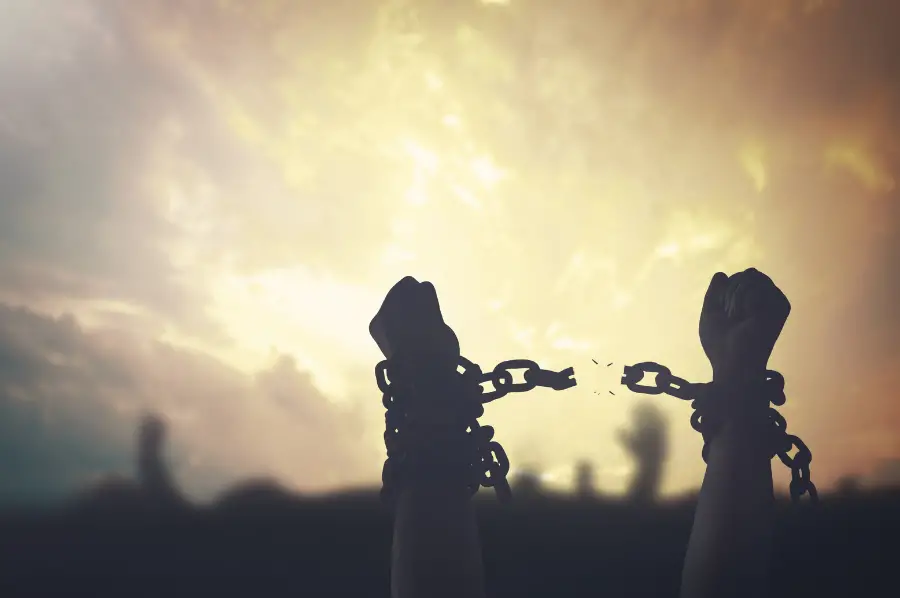
Your healing journey now has nothing to do with the narcissist, beyond using their triggers to pinpoint your inner wounding. I know this might sound a little counterintuitive, but this is the energetic reality.
Healing your inner wounds is the most important step in self-love after narcissistic abuse.
Even if the narcissist is still attacking you or acting horrendously towards you, focusing on your inner healing is the most effective way to rebalance your life and eliminate the narcissist.
Remember, the narcissist was brought into your life in order to shine a light on your deep traumas for healing. Once you can meet each trauma and release it from your body once and for all, your outer world will begin to positively shift to reflect that.
The only truly successful way that I’ve found to access and release my wounds was with the help of an energetic healer, Selena Hill (see below).
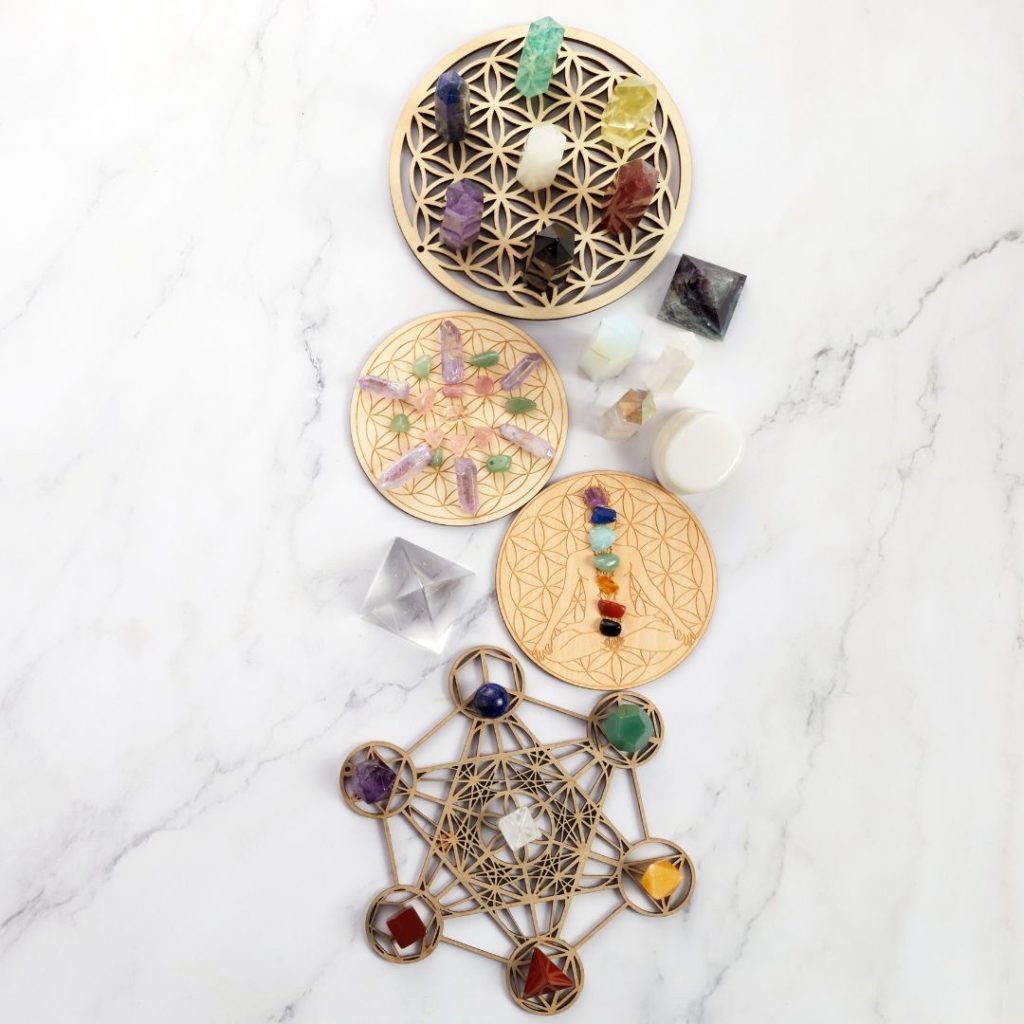
Energetic Healing from
Narcissistic Abuse
If you’ve tried everything to heal but still can’t shift things, it might be time to call in the spiritual realm.
✭ Removal of stuck energy
✭ Removal of old traumas & memories
✭ Past Life Regression
✭ Understanding your journey & how it’s shaped you
✭ Loving & non-judgemental guidance
✭ Psychic mediumship
✭ Ask your guides questions & get direct answers
10% OFF Code ‘UNMASK‘
www.selenahill.com →
Narcissists, disturbingly enough, work on an energetic level. They empty your life force by accessing and activating your wounds. When you go within to remove those wounds, the narcissist has nothing left to work with and will have no choice but to move on to a new victim.
While you’re still ruminating over everything that the narcissist says and does, they’re effectively still feeding off you – even if you have no contact with them! And while you’re still holding onto those traumas, the narcissist continues to evade having to face their karma for their actions.
Think of it this way, once you finally let go of all of the things that have happened and you no longer hold the wounding to go with them, you release the whole package back to the universe. Finally, you’ll have the space to allow the good things to come into your life. And when you let go of trying to be responsible for the narcissist’s karma, then what needs to flow towards them will also happen naturally.
But healing yourself in order for the narcissist to get their karma won’t work either. Because while you’re still focused on them, you can never truly heal. It’s only once you fully let them go and heal yourself, purely for your own soul’s journey, that everything organically falls into place.
Once you begin healing yourself, the effects of Complex PTSD, chronic anxiety and any other ailments you’ve been suffering, will begin to fade away.
The benefits of turning within to heal yourself are limitless!
STEP 7: Rediscover Yourself
After going through a relationship of any type with a narcissist, particularly a long-term one, you end up getting spat out the other side not even knowing who the heck you are.
Over time, the narcissist eroded your sense of self so that they could mould you into their slave and supplier of attention. They didn’t want you to have an identity because then you would be able to confidently think for yourself and hence be harder to manipulate.
Now that you’re free, one of the most exciting self-care after narcissistic abuse perks is the rediscovery of yourself. Or, like so many in the community, you might be truly discovering yourself for the very first time.
You are now free to explore all of the parts of yourself that were previously shut down or you just didn’t have the time or space for.
It could be exploring a new spiritual practice, experimenting with a healthy food and exercise lifestyle or pursuing a creative outlet.
You may want to totally reinvent yourself based on what your new place of self-love aligns with, rather than who you felt you had to be under the narcissist’s influence. A new haircut, wardrobe, household makeover and even a new career might be on the cards for you!
Whatever it is, you’re now free to follow your heart and get closer to who your True Self is yearning for you to be.
STEP 8: Rebuild Your Confidence & Trust

Surviving narcissistic abuse rattles your confidence and trust.
I mean, if that person who you thought genuinely loved you could turn out to be this empty, conscienceless vessel, how are you going to be able to trust anyone else again?
An important step in self-love after narcissistic abuse is to allow yourself as long as it takes to heal and not go blindly into relationships (of any sort) ever again.
Building the confidence back up in yourself to be able to make good, solid decisions in life and trust in your intuition will all come with time.
As your self-worth increases, you’ll begin to understand how healthy people behave, versus how self-serving and insecure people behave, which is the key.
Once you become your own provider of unconditional love, support, security and validation, never again will you seek those things from outside of yourself. Never again will you hand that power over to another soul.
A healthy friendship or relationship is built on reciprocity. You both equally and authentically care about each other and both parties want to give and receive. A healthy person wants to build their partner up and see them flourish because they truly care about them, not because of what’s in it for themselves.
It’s vitally important to understand narcissists and how their minds work so that in future you’ll be able to spot them a mile away, rather than fall prey to their falsities.
Now you get to consciously choose who is in your life.
As a person who has met themselves and is doing their inner work, you will no longer share the same energetic frequency as those who are not willing or able to do that. As your self-love grows, you will naturally no longer wish to spend your time or energy on people who are not respectful or deserving of your time.
You may have lost some people from your life as a result of the narcissist’s fall-out and that’s actually a really good thing. Because now you get to consciously choose who gets to be in your life. If they don’t fit with your authentic truth, then you can both move on in your separate journeys.
More Tips for Self-care After Narcissism
Journaling
Journaling for self-care after narcissistic abuse is highly recommended. Getting those rambling thoughts and wild emotions out of your head and down onto paper is extremely therapeutic.
Writing can also assist with organising your thoughts, which all helps with the acknowledgment and understanding of your story.
I remember coming across some information years ago, which has always stuck with me. Our minds will cycle through three main thoughts over and over in our head on repeat. For the most part, we are not even consciously aware of it until we stop and pay attention.
So, journaling is a fantastic way to pull those thoughts out of the auto-play loop in our mind and physically put them somewhere else.
The mind doesn’t differentiate between thoughts of what you’re currently going through versus what you’ve already been through. Reliving events in your mind leaves the same imprint as if you were physically going through them over and over.
Not to mention the quantum law of ‘so within, so without.’ If you keep staying in the energy of victimhood, pain and trauma, the universe will just keep delivering you more of that experience.
The universe isn’t an evil villain who loves to see you suffer, in fact, it’s quite the opposite. The universe will abundantly offer you whatever it is that you’re focussing on, which is why it’s so important to heal and get yourself out of that stuck place filled with negative experiences.
If you’re keen on writing down your thoughts, but don’t feel like you’ve got a safe space to keep those words, you could do a ‘burn and release.’ This is where you put your thoughts down on paper, then burn the paper and release that energy back into the universe.
No one needs to see what you’ve written, and you will be free of the energy.
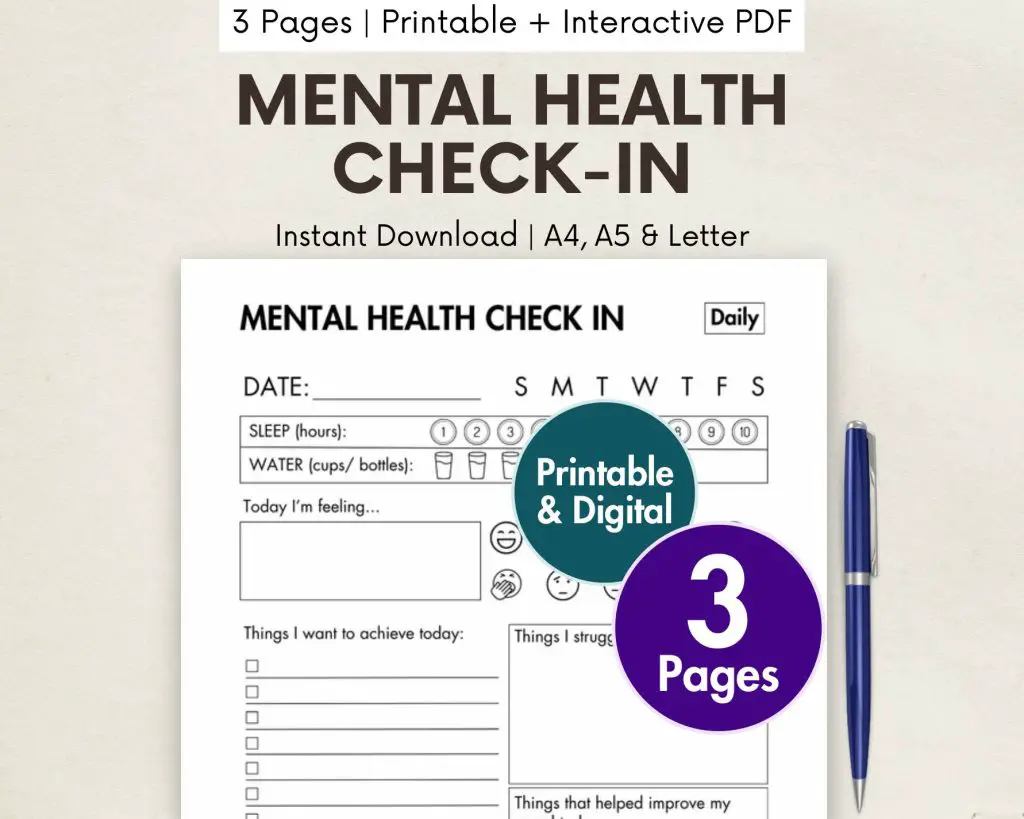
Mental Health Check-in
Keep track of your mental well-being with these fun journal sheets!
- Sleep tracker
- Water intake
- Mood/ emotion tracker
- Struggles & ahievements
- Daily + Weekly + Monthly
- PRINTABLE & DIGITAL
Find a Creative Outlet

Now you finally have the time for yourself to pursue those interests that you’ve always wanted to do, but were never able to when you were tied up with the narcissist.
Maybe things were financially tight and you never had the money to do it, or maybe you just didn’t have the freedom of space and time to follow your own interests.
Whatever the case, finding a creative outlet as part of your self-care regime can be incredibly healing. Taking an art class is a great way to meet new people and help build your confidence levels back up as well.
Get Your Body Moving
Meditation, yoga, walking, swimming… whatever it is that you find soothes your soul and gets your body moving at the same time.
Obviously there are many health benefits to doing physical exercise, but it’s also a good way to get out into nature. Being in nature is so healing and great for recharging the soul after having such a low battery for so long.
My favourite physical thing to do as part of my self-care after narcissistic abuse is to go walking around the park with my good friend of an afternoon. We get to talk about our day and debrief about any current situations that may have arisen with our narcissistic exes. Yep, we both happen to have narc exes who are the father’s of our respective children… so unfortunately neither of us could go full No Contact. It helps to be able to talk things out so that they’re not left swirling around in our heads, plus we get to exercise our bodies at the same time.
Talk It Out

Having a friend or family member who has first-hand experience with narcissism is an absolutely wonderful thing if you’re lucky enough to have that in your life. If not, find a support group or online group where you can let some of your thoughts hit the air.
Another great option is to talk to a therapist who specifically specialises in narcissism, as this can help with your understanding of what you’ve been through. I would steer clear of any professionals who are not experts in narcissism, as you are likely to walk away feeling more to blame for the whole thing than before you walked into their office.
When you’re dealing with narcissism, none of their usual counselling rules apply. Unfortunately, they can create more trauma and damage for you.
Being able to talk out what you’re currently going through is not only validating for you, but it can be very healing for the soul and help to create more self-love.
Although jumping into an online forum and sharing all of your battle stories will give you some relief in the moment, it won’t actually do anything towards your healing.
There is a lot to be said for talking out what’s happened to you, but be mindful not to get stuck in the world of replaying the past on repeat.
Positive aspects of talking out your experiences:
- Talking about the thing itself reduces the amount of shame around the topic
- Letting your thoughts hit the air means you’re less likely to keep re-running the events in your mind on repeat
- Helps you accept what has happened, reducing the amount of shock and disbelief
- Being able to expose the truth of the narcissist without fear of retaliation takes a step towards the narc no longer having power over you
Allocate Time for Yourself Every Single Day
I know this will probably be a whole new phenomenon for you, but setting aside time for yourself every, single day is now an essential part of your daily routine.
No longer do you have to be in a constant state of ‘high alert’ around an energy-sucking creature. No longer do you have to put everyone else’s needs above your own and then when they put their hands out for more, you hand over more (to your own detriment).
Whatever it is that relaxes you, it’s time to pencil some daily guilt-free self-indulgence into your diary.
It might be that when you have your lunch break in the middle of the day, you use that time to sink into a good book or go for a nice nature walk. Giving yourself some time at the end of the day before bed to do something relaxing is also essential for your well-being.
Some pampering self-care ideas:
- Read a good book
- Listen to a podcast
- Watch something of interest on YouTube
- Switch off your mind with some Netflix
- Do your nails or get them professionally done
- Enjoy a good tea or coffee in nature
- Yoga or meditation
- Bath with oils and a candle
- Get creative with a fun and inspiring project
- Take a walk around the neighbourhood
- Spend some quality time with pets, friends or loved ones
Book Your Appointments
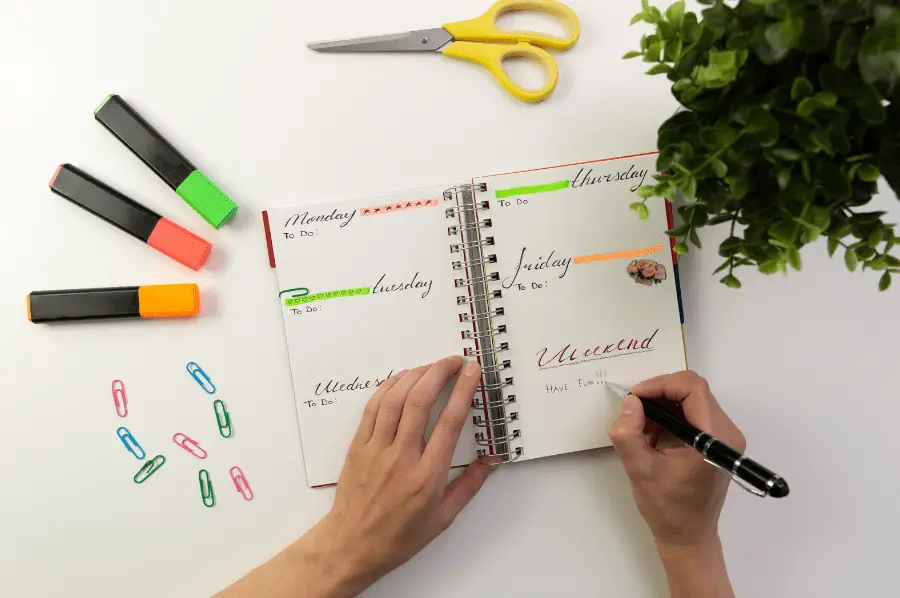
Something that I’ve noticed is all too common with victims of narcissistic abuse, is that they tend to put off making appointments for themselves.
When was the last time you had a nice haircut or got your vitamin levels checked? Have you got a funny spot on your body that you’ve been meaning to get checked out for yonks, but just never get around to? When was the last time the car had a service or you went to the dentist?
I think you can see where I’m going here.
People who are on the receiving end of narcissism often end up procrastinating or downplaying the need to care for themselves. They’ve been so programmed by the narc that they ‘don’t matter,’ so they don’t even bother with themselves any more. Heck, who even has the money or energy for that when your partner is so self-absorbed and actively makes you feel bad for caring about yourself?
I know I was personally guilty of this, so after leaving the narcissist, I started to make all of those appointments for myself. One by one I was attending to my own needs and actually feeling good about doing so! There was no one there to devalue me or make me feel guilty for having a regular beauty appointment or anything else that I needed or wanted to do for myself.
These days, I’ve got regular appointments for looking after myself, looking after my belongings and just generally prioritising myself in my life and it feels great!
The best thing I bought for myself at the start of this year was a beautiful diary planner. Now I’m able to confidently make plans for myself and easily stay organised with my busy life, which is now centred around myself and my kids – not the narcissist!
Regularly Declutter & Update Your Wardrobe
My final advice for self-care after narcissistic abuse is about your outer world.
Our physical world is a visual representation of what’s going on inside of us. I always find that deep cleaning and decluttering the house is wonderful for the soul. You feel lighter afterwards as you purge the old and make way for the new.
This is also a good chance to ditch anything around the house that reminds you of the narcissist – you don’t need that heavy energy in your new life.
As a part of self-care after narcissistic abuse, taking pride in your appearance isn’t only a nice thing to do, it’s essential for your self-love and worthiness.
You’ve spent so long putting everyone else’s needs first, that you probably let yourself go and didn’t even have the desire or energy to do anything about it.
I recommend doing a wardrobe declutter at the start of every season and buying yourself some new items that make you feel good and work well for your body shape. This doesn’t have to be an expensive task, thrifting is a great way to get new, unique pieces every season!
Here’s a great post on decluttering clothes that you might find handy.

Freedom is the Ultimate Act of Self-love!

Once you no longer have the narcissist in your life controlling you, invalidating every little thing you do, pushing you around and complaining, you’ll begin to realise just how free you are. And it’s in that freedom that you begin to fully grasp how caged you truly were by the narcissist.
For me, taking the time to be single after narcissistic abuse has cemented what I will never tolerate again and how secure I really am by myself.
Once you’re totally comfortable knowing that you do not need anybody else as your source of love, survival and security, then you can step into a new relationship (when the time and the person are right) as a whole being.
You won’t be taking in your own clingy baggage or putting up with subpar behaviour for fear of being alone or not being able to pay the rent by yourself. Because your sovereignty is worth the absolute most to you and never again will you compromise that for someone who hasn’t met themselves and done their own work.
Posts About Healing From Narcissistic Abuse
- Spiritual Healing From Narcissistic Abuse
- Closure Letter to a Narcissist
- Learning to Trust After Narcissistic Abuse
- 15 Symptoms of C-PTSD from Narcissistic Abuse
- QUIZ: Narcissistic Abuse Syndrome
- Narcissism & Spiritual Awakening
- 10 Adrenal Fatigue Recovery Tips
- Narcissists & Karma
- Self-care After Narcissistic Abuse


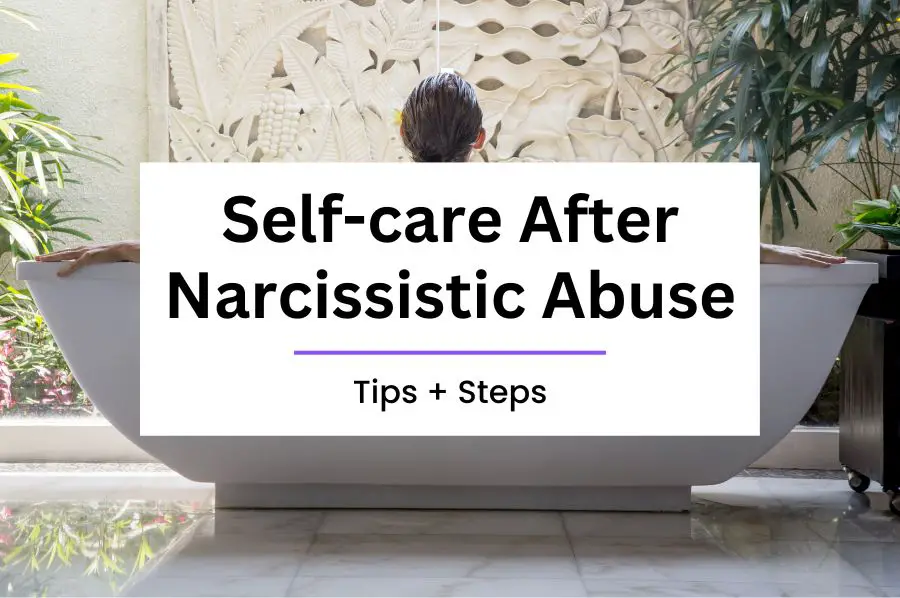
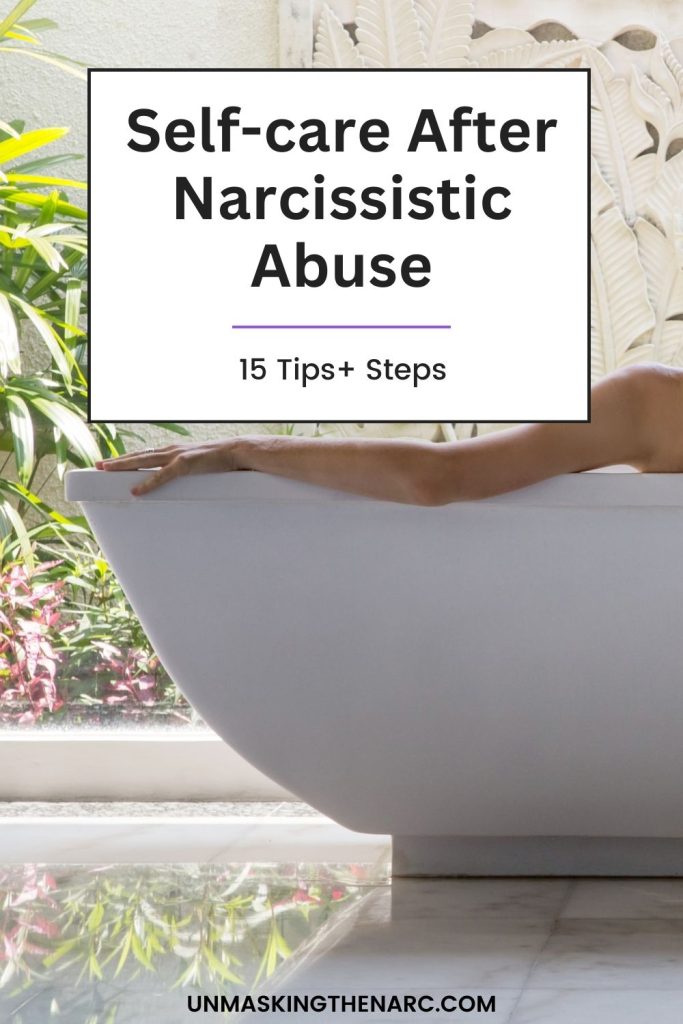
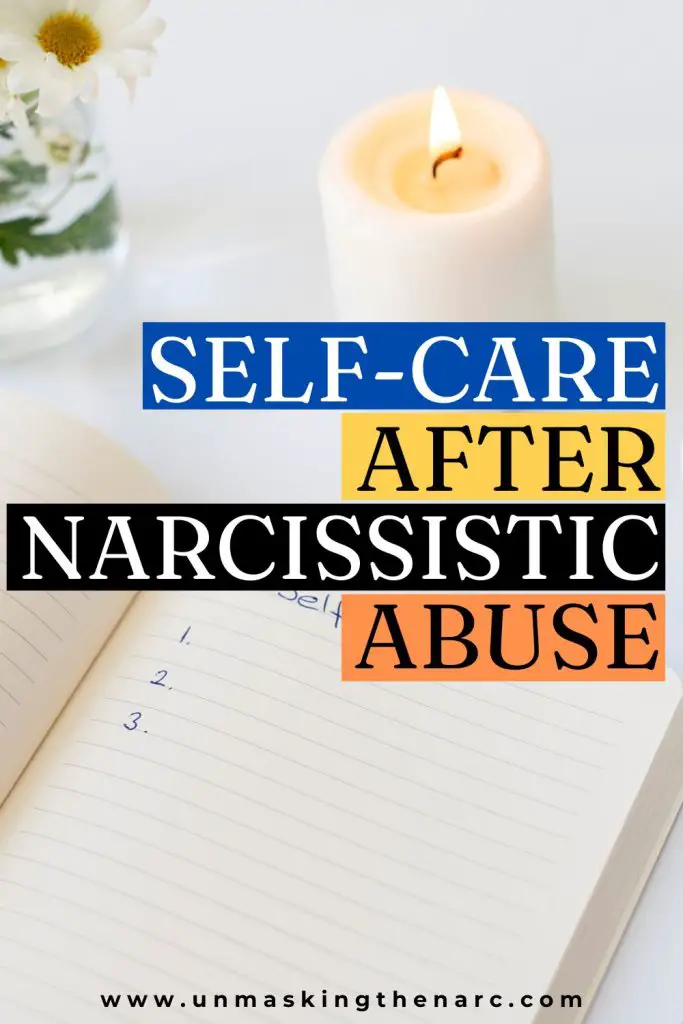
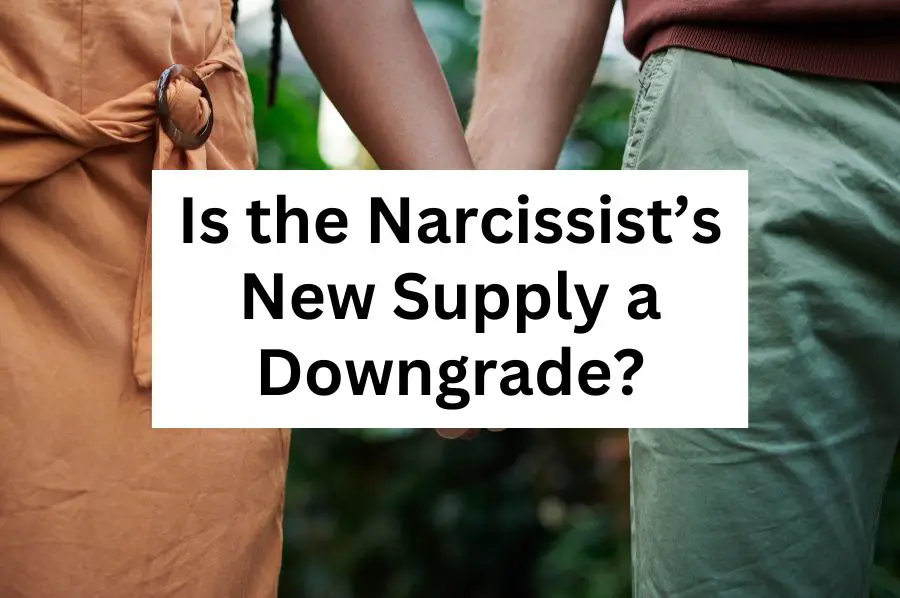
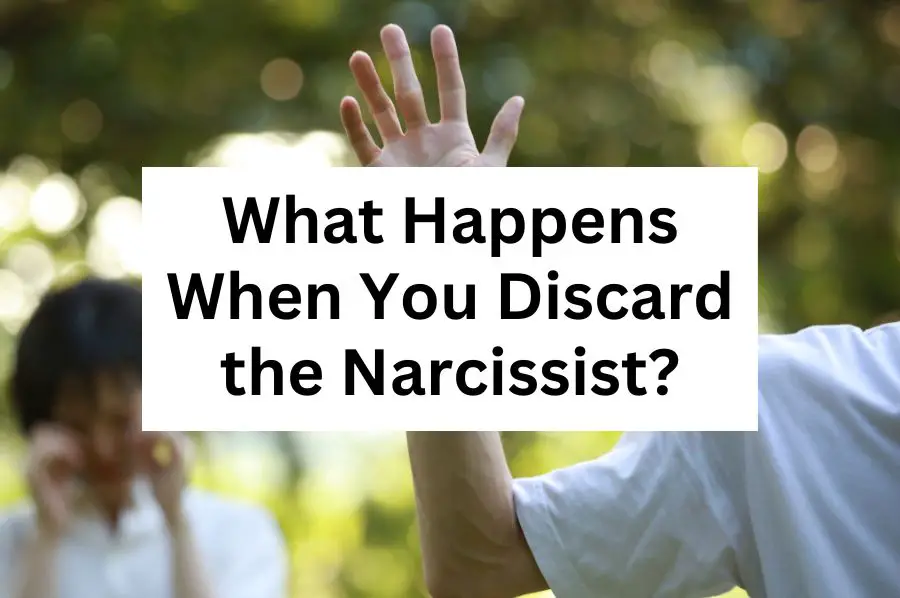
Your article is the absolute best most complete and understandable content to read and digest and APPLY to recognize and heal from emotional abuse. I already shared it on my social media. THANK YOU FOR TAKING THE TIME TO WRITE THIS FOR ALL OF US WHO WERE GASLIT, SHAMED OR IN DENIAL.
Thanks Dominick, I’m so glad you’ve found it helpful. Self-care is the #1 most important thing after emotional abuse.